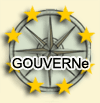|
Some examples of relevant ongoing and finished projects carried
out by InGentibus associated institutes and companies are:
 |
Isotopic TEchnologies applied to the
analysis of ancient Roman mortars |
A cultural heritage project on roman
mortars
This project has developed an innovative database of mortar characteristics
based on the collection of all analytical data concerning isotopic
technologies in complement to the traditional ones, with the aim
of enabling to reproduce the mortars more accurately for more
authentic preservation and restoration of ancient buildings and
artefacts. It has also produced prototypes of mortars at laboratory
scale, based on the knowledge and data gained in the course of
the project.
Website: http://www.iter-eu.com
 |
Social Learning on EnVIRonmental Issues
with the InTeractive Information and CommUnicAtion TechnoLogIeS. |
IT educational
tools applied to climate change, water resources, agriculture
and marine fisheries
The project brought together a consortium of specialists in information
technology, sustainable development, environmental modelling,
public policy and governance, learning psychology and open learning,
to develop computer-based learning tools on ecosystems and natural
resources. The four domains are climate change, freshwater resources,
agricultural pollution and marine capture fisheries. Taking these
four domains as exemplary, ViRTU@LiS creates learning tools for
improving citizens' awareness of environmental management and
risks.
Website: http://www.virtualis-eu.com
 |
Guidelines for the Organisation, Use
and Validation of information systems for Evaluating aquifer
Resources and Needs |
Deliberation support IT tools
for governance issues.
This project has developed and implemented user-based and scientifically
validated Decision Support System (DSS) for the improved management
of underground water resources at the catchment and sub-catchment
levels. Decision support is understood as not only the acquisition,
scientific validation and organisation of information, but also
procedures for effective exploita-tion of this information by
users. The DSS combines spatial representation, scenario simulation,
multiple criteria evaluation and interactive user-friendly interfaces.
It furnishes a validated scien-tific support for debate and deliberation
by decision makers and stakeholders permitting intelli-gent compromises,
identification of novel management options and, to the extent
possible, coop-erative conflict resolution.
Website: http://www.futuretec-gmbh.de/gouverne/
|